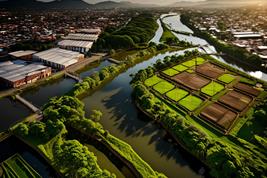27.06.2024

A study by the Leibniz Center for Agricultural Landscape Research (ZALF) sheds light on the different attitudes of political and administrative decision-makers towards nature-based solutions (NBS) in water management. The case study, published in the journal "Ecosystems and People", examines the views and priorities of decision-makers in Costa Rica and provides valuable insights into the challenges and opportunities of implementing NBS.
In her master's thesis, Franka Pätzke, a graduate of Humboldt-Universität Berlin, investigated the attitudes of the members of the Tárcoles River Basin Commission in Costa Rica towards the implementation of a fictitious constructed wetland. The Tárcoles River is considered one of the most polluted rivers in Costa Rica. A constructed wetland is a nature-based solution for wastewater treatment in which plants are used to purify the water. These systems use the natural processes of plants, microorganisms and the soil to remove pollutants from the water. In contrast to other technical, chemical or biological processes for cleaning rivers, constructed wetlands are comparatively inexpensive to set up and operate and can filter a wide range of pollutants from greywaters. Another advantage is that valuable habitats are created for biodiversity protection. However, despite all the advantages, constructed wetlands are not yet widely installed.
The study identified three recognizable positions among decision-makers from the region studied: "the nature lovers", "the cost-conscious" and "the willing to participate". It became clear that the decision-makers had a common vision in favor of the nature-based solution. However, there were major differences when it came to setting priorities.
A paradigm shift is needed
Using the constructed wetland as an example, Franka Pätzke was able to identify other important barriers that make the implementation of NBS more difficult. "Our research shows that a paradigm shift in policy-making towards ecosystem-based approaches is urgently needed," says Franka Pätzke. "The different attitudes of decision-makers illustrate that more collaboration, better understanding and more funding opportunities for nature-based solutions are needed to improve their planning and implementation. In addition, the importance of financing NBS through private companies was emphasized."
Creating awareness and knowledge for nature-based solutions
The research findings suggest that awareness and knowledge of nature-based solutions must be increased to promote their acceptance and application. "It is important that all levels of government work together to effectively integrate and fund NBS," says Pätzke.
Funding
This work was supported by the German Federal Ministry for Education and Research Bundesministerium für Bildung und Forschung (BMBF) providing funding through a grant for the PlanSmart research group [grant no: 01UU1601B] and for the SEE-URBAN-WATER research group [grant no. 01UU1704], and by the University of Costa Rica [grant no: Pry01-532-2020], with direct funding from the participant academic units School of Architecture, Engineering Research Institute and Program for Sustainable Urban Development – ProDUS, in supporting PlantSER project.
